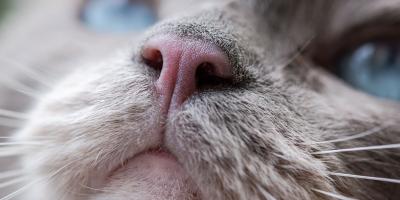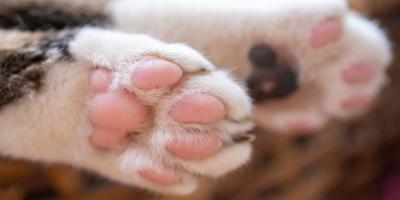Lilies are pretty springtime flowers, so they can’t be that harmful to cats, right? Are lilies dangerous to cats? Well, the bad news is that lilies are very poisonous to cats. If a cat happens to nibble on even a morsel, it can potentially cause kidney failure or worse.
As a longtime cat parent, I purchased lilies without knowing the possible consequences. Little did I know, I was lucky enough to keep those lilies out of my cat’s reach.
Our experts explain the potential dangers between cats and lilies, providing information on different types of lilies that are toxic to cats and explaining how ingesting different parts of the plant can cause serious health problems. We also offer tips on what to do if a cat has eaten a lily, starting with the importance of seeking veterinary care immediately.
Which Lilies Are Toxic to Cats?
Because cats and lily plants go so poorly together, we hope to help cat owners like you identify toxic lily plants and take the necessary precautions during the holidays or any time. Here are a few common lilies toxic to cats.
True Lilies
True lilies typically have prominent and large flowers, all growing from bulbs. Most are native to the Northern Hemisphere.
So, are Easter lilies poisonous to cats? Unfortunately, yes. Easter lilies and cats should remain as far away from each other as possible if being used for Easter decorations in a home with a cat. Cats also need to remain away from the beautifully decorative Asiatic lilies. Cats should live in a lily-free environment. Here are a few more types of true lilies that are considered the most toxic to cats, possibly resulting in acute kidney injury:
- Stargazer lilies
- Rubrum lilies
- Tiger lilies
- Japanese lilies
- Oriental lily hybrids
- Casa Blanca lily
Eating even a tiny bit of the lilies can damage kidneys, resulting in kidney failure or possible death. The entire plant is toxic, including, but not limited to, its pollen, stem, leaves and petals.
Knowing the potential dangers between lily pollen and cats is of utmost importance. Cats’ lily pollen consumption should be null. Even the tiniest amount of pollen can easily land on cat fur and be ingested during grooming, posing a grave threat to their health.
Day Lilies and Cats
Day lilies are not true lilies, but they look very similar to them, just a little smaller than most. Cats’ consumption of day lilies can result in acute kidney injury.
All Lilies Can Make Cats Sick
Other varieties of lilies aren’t as life-threatening as the true lily varieties, including but not limited to the following:
- Peruvian lilies
- Lily of the valley flowers
- Flame lilies
However, they can still make cats that eat them sick. Here are a couple more of the most common lilies to look out for.
Calla Lilies
Are calla lilies toxic to cats? Yes.
Calla lilies and cats don’t mix. Calla lilies, or trumpet lilies, have bell-shaped flowers and grow in various colors, with often-maculated, medium-green leaves. They’re hardy plants that can grow in many different places across the planet. If a cat ingests calla lilies, they may experience severe irritation to the inside of their mouth and GI tract.
Peace Lilies
Are peace lilies poisonous to cats? Yes.
Peace lilies are most commonly houseplants. They look like the calla lilies poisonous to cats, except smaller. They usually have white, yellowish, or greenish flowers, and darker green leaves. Outdoors, they can be found in humid parts of the United States. They contain the same severely irritating toxins to cats as calla lilies.
Why Are Lilies Toxic to Cats?
Lilies are toxic to cats for varying reasons, depending on the type of lily, such as the following:
- True Lilies: Consuming any part of true lilies or even the water in its vase can cause kidney failure, neurological damage, or severe, potentially irreversible kidney damage. The exact toxins causing this remain uncertain, and there is no antidote.
- Lily of the Valley: Poisonous to cats, these flowers have a cardiotoxin, which is toxic, causing arrhythmias and possibly death
- Flame Lilies: Also known as gloriosas, these lilies contain colchicine, a toxin to cats’ cells. Cats that chew on flame lilies may experience multiorgan failure due to this toxin.
- Calla and Peace Lilies: These flowers contain oxalate crystals that can irritate the esophagus, tongue and throat.
Signs of Lily Poisoning in Cats
The potential hazards of lilies may vary depending on the type of lily, a cat’s overall health and the amount of lily consumed. Symptoms of lily poisoning in cats typically show up as soon as two hours after cats eat any part of a lily plant. There are a few common signs of lily poisoning in cats to look out for. Here are a few of the general signs of lily poisoning in cats:
- Vomiting, which may stop a few hours after cats eat the plant but requires veterinary care regardless
- Drooling
- Loss of appetite
- Diarrhea
- Seizures and tremors
- Lethargy
- Lack of thirst or excessive thirst
- Not peeing or excessive peeing
- Disorientation
- Dehydration
- Sunken eyes
- Dry mouth
- Dull coat
- Weakness
- Sores or ulcers in the mouth
- Low blood pressure
- Fast heartbeat
- Vocalizing
Calla and Peace Lily Poisoning Signs
Immediate signs, particularly of calla or peace lily toxicity, may include the following:
- Drooling
- Scratching at the mouth
- Vomiting
- Loss of appetite
Daylily and True Lily Poisoning Signs
In the first 12-24 hours, if left untreated, potentially irreversible kidney damage starts to develop with daylily and true lily poisoning. Symptoms at that point may include:
- Increased thirst
- Tremors
- Increased urination frequency
- Dehydration
- Depression
After a day left untreated, kidney damage may be fatal. At this point, neurologic symptoms may develop. Additional signs at this point may include:
- Seizures
- Not peeing
- Disorientation
- Can’t walk
- Coma
- Death
Treatment for Lily Poisoning in Cats
If your cat ate lilies, contact your veterinarian immediately and take them to a local emergency room if your veterinarian cannot see them right away. Because lilies can cause severe feline health issues, if you suspect your cat consumed any number or part of lilies, you must call your veterinarian as soon as possible so your cat can get all the treatment it needs to recover well.
If you can’t get ahold of a vet, contact the Animal Poison Control Center (APCC) immediately at (888) 426-4435.
If possible, bringing in the plant you suspect your cat ate is a good idea so the vet can more quickly identify the best treatment. You can also take a picture of it.
There is currently no antidote for lily poisoning, so treatment for lily poisoning will likely focus on some of the following care:
- Inducing vomiting
- Emptying the cat’s stomach
- Removing any lily pollen from the cat’s coat and skin
- Intravenous (IV) fluids to:
- Flush out any toxins in the bloodstream
- Support the cat’s kidneys
- Feeding activated charcoal to reduce further absorption of the lily
Lab work and an ultrasound may evaluate possible damage. A poisoned cat will most likely require hospitalization. These tests may need to be repeated multiple times to view the extent of the damage over time.
With prompt treatment, a cat may recover from lily poisoning, though some suffer kidney damage. If so, your vet may manage the damage with prescribed medication, fluids or hospitalization.
How to Keep Cats Away From Lilies
If possible, avoid having lilies in your home environment. If you do have lilies, make sure they are entirely out of reach for your furry friend, considering how most cats might like to climb. Again, it’s better not to have them in the first place. Just keep lilies and cats separate!
A few cat-safe flowers to consider as alternatives may include:
- Orchids
- Wax flowers
- Blushing bromeliads
- Sunflowers
- African violets
- Gloxinias
- Roses
- Gerbera daisies
- Snapdragons
- Asters
- Zinnias
- Celosias
- Alstroemerias
- Dense blazing stars
- Freesias
- Madagascar jasmines
- Baby’s breaths
- Stocks
For more expert tips on caring for your cat, explore our other cat routine care articles.
Related articles

Earn myPurina Rewards with Every Purchase
Use your points for treats, toys, and gift cards with myPurina app.




